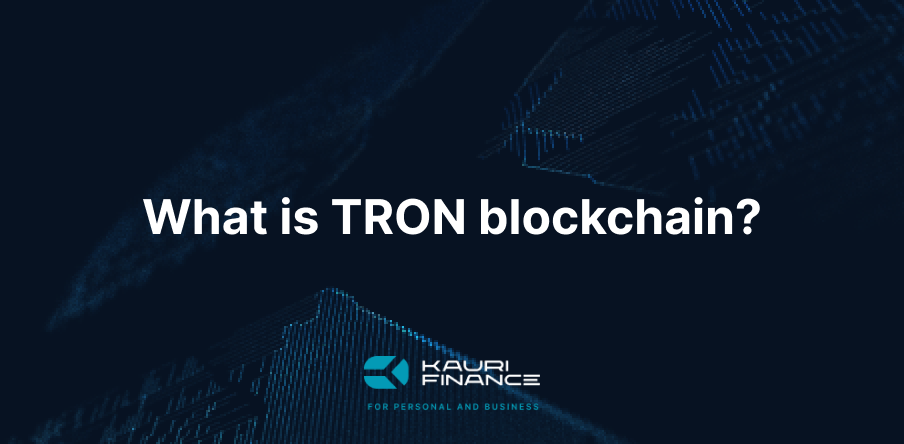
What Is TRON blockchain and how does it work?
- What Is TRON Blockchain?
- What Is TRON?
- TRON (TRX) Blockchain Platform Explained and How Does It Work?
- High Throughput and Scalability
- Consensus Mechanism
- Smart Contracts and dApps
- The Potential of TRON
- Decentralized Content Sharing
- Partnerships and Ecosystem Expansion
- DeFi and Beyond
- What Does TRON Blockchain Do?
- How Does TRON (TRX) Work?
- Is TRON the Same as Ethereum?
- Differences in Focus and Technology
- Transaction Costs and Speeds
- Is TRC20 the Same as TRON?
- Is TRON a Good Investment?
- Market Performance and Potential
- Risk Factors
- Investment Considerations
- What Makes TRON Unique?
- Focus on Entertainment and Content Sharing
- High Throughput and Low Costs
- Strong Ecosystem and Partnerships
- How Many TRON (TRX) Coins Are in Circulation?
- Total Supply and Circulation
- Distribution and Allocation
- How To Choose a TRON Wallet
- Recommended Wallet: KAURI Crypto Wallet

What Is TRON Blockchain?
TRON is a blockchain-based decentralized platform aimed at building a free, global digital content entertainment system with distributed storage technology. This allows for easy and cost-effective sharing of digital content. Founded by Justin Sun in 2017, TRON's blockchain is known for its high throughput, scalability, and efficiency in handling decentralized applications and smart contracts.
Unlike traditional content platforms that operate under centralized control, TRON aims to decentralize the web by enabling direct interactions between content creators and consumers. This eliminates the need for intermediaries, reducing costs and increasing the profitability for creators.
What Is TRON?
TRON is a blockchain platform specifically designed for entertainment and content-sharing purposes. Its native cryptocurrency, TRX, is used to pay for content and services on the network. TRON aims to construct a decentralized internet and has its own blockchain, separate from Ethereum and Bitcoin.
TRON was initially launched on Ethereum's blockchain as an ERC-20 token but transitioned to its own blockchain in 2018. The platform supports a variety of dApps and smart contracts, similar to Ethereum, but focuses primarily on entertainment and content sharing.
TRON (TRX) Blockchain Platform Explained and How Does It Work?
High Throughput and Scalability
TRON’s blockchain is distinguished by its high throughput, allowing it to process transactions at a much faster rate than many other blockchains. This is achieved through a Delegated Proof of Stake (DPoS) consensus mechanism, which differs from the traditional Proof of Work (PoW) used by Bitcoin and Ethereum. DPoS involves a voting system where stakeholders elect delegates to validate transactions and create new blocks.
Consensus Mechanism
The DPoS mechanism enables TRON to achieve high scalability and efficiency. In TRON’s network, 27 Super Representatives (SRs) are elected every six hours to validate transactions and create blocks. This system is designed to enhance the decentralization of the network while maintaining high transaction speeds and low costs.
Smart Contracts and dApps
TRON supports smart contracts and dApps through its Virtual Machine, which is compatible with the Ethereum Virtual Machine (EVM). This allows developers to easily port Ethereum-based applications to the TRON network. The platform provides a robust environment for developers to create and deploy dApps, with lower transaction fees compared to Ethereum.
The Potential of TRON
Decentralized Content Sharing
TRON's main focus on the entertainment and content-sharing industry gives it a unique position in the blockchain space. By enabling content creators to publish their work directly on the blockchain, TRON eliminates the need for centralized platforms, which often take a significant portion of the revenue. This decentralized approach provides more control and profitability to content creators.
Partnerships and Ecosystem Expansion
TRON has formed several partnerships with prominent companies and organizations, enhancing its ecosystem and adoption. These partnerships span various industries, including gaming, entertainment, and social media. By integrating TRON's blockchain into these sectors, the platform aims to increase its user base and drive further adoption of TRX.
DeFi and Beyond
TRON is also making strides in the decentralized finance (DeFi) sector, offering various DeFi applications and services. The platform's low transaction fees and high throughput make it an attractive option for DeFi projects. As the DeFi ecosystem continues to grow, TRON is well-positioned to become a significant player in this space.
What Does TRON Blockchain Do?
Content Storage and Distribution
TRON provides a decentralized platform for storing and distributing digital content. By leveraging distributed storage technology, TRON allows users to store content in a decentralized manner, making it less susceptible to censorship and centralized control. This storage system also ensures that content creators have full ownership of their work and can monetize it directly through the blockchain.
Smart Contract Execution
TRON supports the execution of smart contracts, enabling developers to create decentralized applications that can automate processes and transactions. These smart contracts are stored on the blockchain and can be executed without the need for intermediaries, ensuring transparency and security.
Token Creation and Management
TRON allows for the creation and management of tokens through its TRC-10 and TRC-20 standards. TRC-10 tokens are native tokens that are built directly into the TRON blockchain, while TRC-20 tokens are more advanced and compatible with Ethereum's ERC-20 standard. These tokens can be used for various purposes, including fundraising, payments, and rewards.
How Does TRON (TRX) Work?
TRON processes transactions through its DPoS consensus mechanism, which allows for high transaction speeds and low costs. Transactions are validated by Super Representatives, who are elected by stakeholders and are responsible for maintaining the network. This system ensures that TRON can handle a large volume of transactions efficiently.
TRON's DPoS mechanism involves staking TRX tokens to vote for Super Representatives. Stakeholders who participate in the voting process receive rewards in the form of TRX tokens. This incentivizes participation in the network and helps maintain its security and efficiency.
Developers can create and deploy dApps on the TRON network using its Virtual Machine. These dApps can range from simple games to complex financial applications, and they benefit from TRON's high throughput and low transaction fees. The platform also provides tools and resources for developers to build and launch their dApps effectively.
Is TRON the Same as Ethereum?
Differences in Focus and Technology
While TRON and Ethereum both support dApps and smart contracts, they differ significantly in their focus and technology. Ethereum was the first platform to introduce smart contracts and remains a leader in the space, with a broad range of applications across various industries. TRON, on the other hand, focuses primarily on the entertainment and content-sharing sectors, aiming to decentralize these industries and provide more control to content creators.
Ethereum currently uses a Proof of Stake (PoS) consensus mechanism, which involves validators staking their ETH to secure the network. TRON uses a Delegated Proof of Stake (DPoS) mechanism, which involves electing Super Representatives to validate transactions. This difference in consensus mechanisms leads to variations in transaction speeds, costs, and scalability between the two platforms.
Transaction Costs and Speeds
TRON is known for its lower transaction fees and higher throughput compared to Ethereum. This makes it an attractive option for applications that require frequent and low-cost transactions, such as gaming and content sharing. Ethereum's transaction fees can be higher, especially during periods of network congestion, which can be a drawback for certain applications.
Is TRC20 the Same as TRON?
TRC-20 is a technical standard used for tokens issued on the TRON blockchain, similar to Ethereum's ERC-20 standard. TRC-20 tokens are compatible with Ethereum's ERC-20 tokens, making it easier for developers to port their applications and tokens from Ethereum to TRON.
The TRC-20 standard allows for the creation and management of tokens on the TRON network, enabling interoperability with Ethereum-based tokens and applications. This compatibility facilitates the migration of projects and users between the two platforms, enhancing the overall utility and adoption of TRON.
Is TRON a Good Investment?
Market Performance and Potential
TRON has shown significant growth since its inception, becoming one of the top cryptocurrencies by market capitalization. Its focus on the entertainment and content-sharing industries gives it a unique position in the market, which could lead to further adoption and value appreciation.
Risk Factors
Like all cryptocurrencies, TRON carries certain risks, including market volatility, regulatory changes, and technological challenges. Investors should consider these factors and conduct thorough research before investing in TRX. The platform's reliance on the entertainment industry also means that its success is closely tied to developments in this sector.
Investment Considerations
TRON's potential for growth is supported by its high throughput, low transaction fees, and focus on decentralized content sharing. However, investors should consider the broader market conditions, competition from other blockchain platforms, and the platform's ability to attract and retain users and developers.
What Makes TRON Unique?
Focus on Entertainment and Content Sharing
TRON's primary focus on the entertainment and content-sharing industries sets it apart from other blockchain platforms. By providing a decentralized platform for digital content, TRON aims to give creators more control and profitability, reducing the need for intermediaries.
High Throughput and Low Costs
TRON's DPoS consensus mechanism enables high transaction speeds and low costs, making it an attractive option for applications that require frequent and cost-effective transactions. This efficiency is particularly beneficial for dApps in the gaming and content-sharing sectors.
Strong Ecosystem and Partnerships
TRON has established a strong ecosystem with numerous partnerships across various industries. These collaborations enhance TRON's utility and adoption, driving further growth and development of the platform.
How Many TRON (TRX) Coins Are in Circulation?
Total Supply and Circulation
As of now, there are approximately 89 billion TRX coins in circulation, with a total supply capped at 100 billion. TRX is used for various purposes within the TRON ecosystem, including staking, voting, and transactions.
Distribution and Allocation
TRX tokens are distributed through a combination of staking rewards, Super Representative rewards, and ecosystem incentives. This distribution model aims to promote participation in the network and support its growth and development.
How To Choose a TRON Wallet
Choosing the right wallet for storing TRX is crucial for ensuring the security of your digital assets. There are various types of wallets available, including hardware wallets, software wallets, and web wallets. When selecting a wallet, consider factors such as security features, ease of use, and compatibility with TRON's network.
Recommended Wallet: KAURI Crypto Wallet
For those looking for a secure and reliable TRON wallet, the KAURI Crypto Wallet is an excellent option. It supports multiple chains, including TRON, and offers robust security features to protect your assets. The wallet is user-friendly and provides a seamless experience for managing your TRX and other digital currencies.
This article provides a comprehensive overview of TRON, its blockchain, and its potential. By understanding the unique features and advantages of TRON, investors and users can make informed decisions about engaging with this innovative platform. As with any investment, it's essential to conduct thorough research and consider various factors before committing to TRX.
